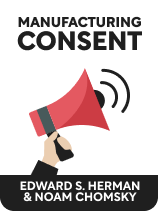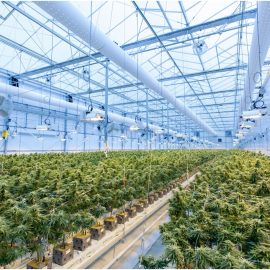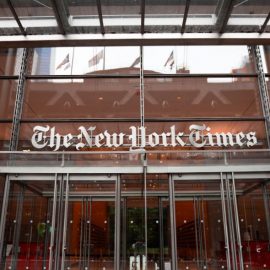

This article is an excerpt from the Shortform book guide to "Manufacturing Consent" by Edward S. Herman and Noam Chomsky. Shortform has the world's best summaries and analyses of books you should be reading.
Like this article? Sign up for a free trial here .
What’s the book Manufacturing Consent about? What are the main praises and criticisms of the book?
In their 1988 book, Chomsky and Herman argue that the media and the news are indirectly censored, despite freedom of press and speech. They believe that the elite—the rich and the powerful—control what news gets published and what gets ignored.
Here’s an overview of the book Manufacturing Consent.
A Brief Overview
In the book Manufacturing Consent, authors Noam Chomsky and Edward S. Herman explore how the American media frames events and creates narratives that serve the interests of the nation’s political, economic, and social elite.
They argue that control of the media in the United States does not take the form of direct state censorship or a formal conspiracy to manage the news. Rather, there is a powerful set of informal restrictions and controls that limit what journalists cover—and how they cover it.
The authors argue that this co-opting of the media happens through an informal, decentralized, yet highly effective propaganda model. They support this theory by exploring the media’s close connections to the nation’s social and economic elite, the financial incentives of big media conglomerates, how news outlets source their stories, and how the mainstream press suppresses divergent and nonconformist views.
| Journalists Also Face Formal Government Censorship Although Chomsky and Herman are mainly concerned with informal, non-state-directed control of the media, there have been recent incidents that have featured the United States government directly interfering with journalists. In 2013, the Obama administration subpoenaed the phone records of close to 100 Associated Press journalists as part of a probe into a story about a CIA operation in Yemen. The Trump administration likewise tried to obtain journalists’ communications by seeking email records from New York Times reporters and then placing a gag order on the newspaper, forbidding it from revealing the request. Incidents like this show that the media is not immune to governmental interference, but Chomsky and Herman’s focus on the more informal pressures that media outlets face implies they believe these pressures are perhaps more dangerous because they’re less visible. |
About the Authors
Noam Chomsky is a leading public intellectual, linguist, historian, political activist, and social critic. A major figure in the study of language, Chomsky is an intellectual pioneer of groundbreaking linguistics theories such as universal grammar and generative grammar. Long known for his left-leaning political views, Chomsky has, for over half a century, been an outspoken supporter of pacifism, unfettered freedom of speech, economic redistribution, and social justice. One of the most widely cited scholars in the world, he is the author of over 150 books on topics ranging from linguistics to US foreign policy, political science, history, and terrorism.
Edward S. Herman (1925-2017) was a prominent critic of American media and foreign policy. In over 20 published books, Herman made important contributions to contemporary progressive views on corporate power, human rights, and American militarism.
Praise and Criticism
Manufacturing Consent is widely viewed as a landmark work in the field of media scholarship with its groundbreaking insights into how corporate and state power work together to produce propaganda that reinforces the economic, social, and political power structure.
Contemporary reviews from 1988 praised the book for its unique analytical framework in dissecting how the news media aids, abets, and covers up the mistakes of the US government—and American foreign policy in particular. Reviewers noted that Chomsky and Herman’s analysis raised disturbing questions for how the US could expect to lead an effective and moral foreign policy with a journalistic establishment that was so heavily compromised by private and state propaganda. As recently as 2017, investigative journalists cited Manufacturing Consent as one of the most important books ever written on the media and a “bible” for dissident and anti-establishment media critics.
However, reviewers also noted factual errors in the book, for example, failing to give mainstream media outlets credit for when they did harshly criticize deceitful acts by the Reagan administration. Similarly, reviewers criticized the book for what they saw as an inadequate explanation for how, in a supposedly all-powerful propaganda system, grassroots and independent media was still able to expose some of the Reagan administration’s more radical foreign policy actions (such as illegally funding the right-wing Contra movement in Nicaragua).
Finally, the book was heavily criticized for the authors’ apparently selective highlighting of violence and repression by right-wing regimes and their minimizing of violence and genocide by left-wing or Communist regimes (most notably their downplaying of the mass murder of Cambodians at the hands of the Khmer Rouge).

———End of Preview———
Like what you just read? Read the rest of the world's best book summary and analysis of Edward S. Herman and Noam Chomsky's "Manufacturing Consent" at Shortform .
Here's what you'll find in our full Manufacturing Consent summary :
- How the American media frames events and creates narratives that serve the elite
- How elites indirectly censor media and avoid censorship laws
- Why corporate media outlets value profit above truth or news value






